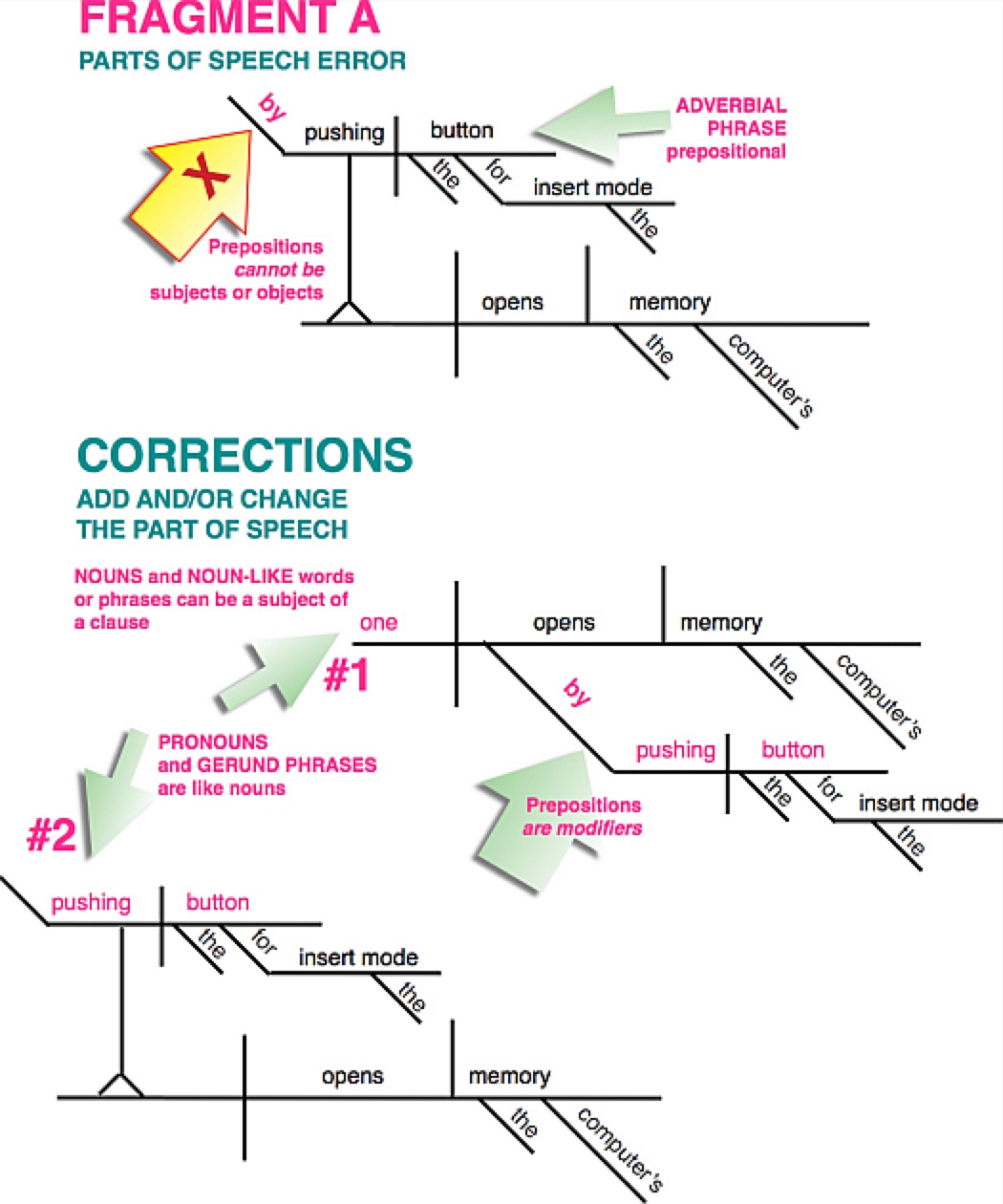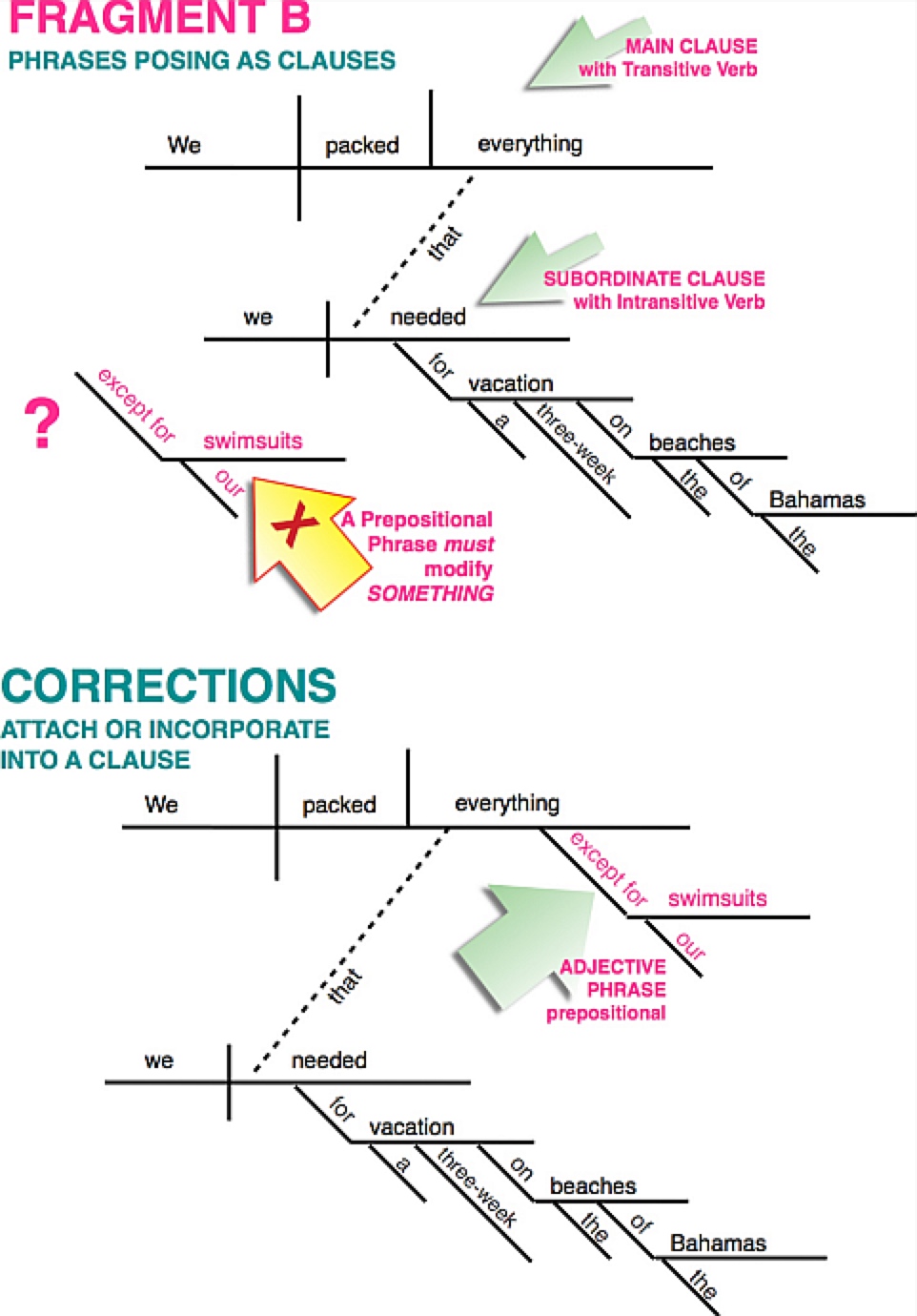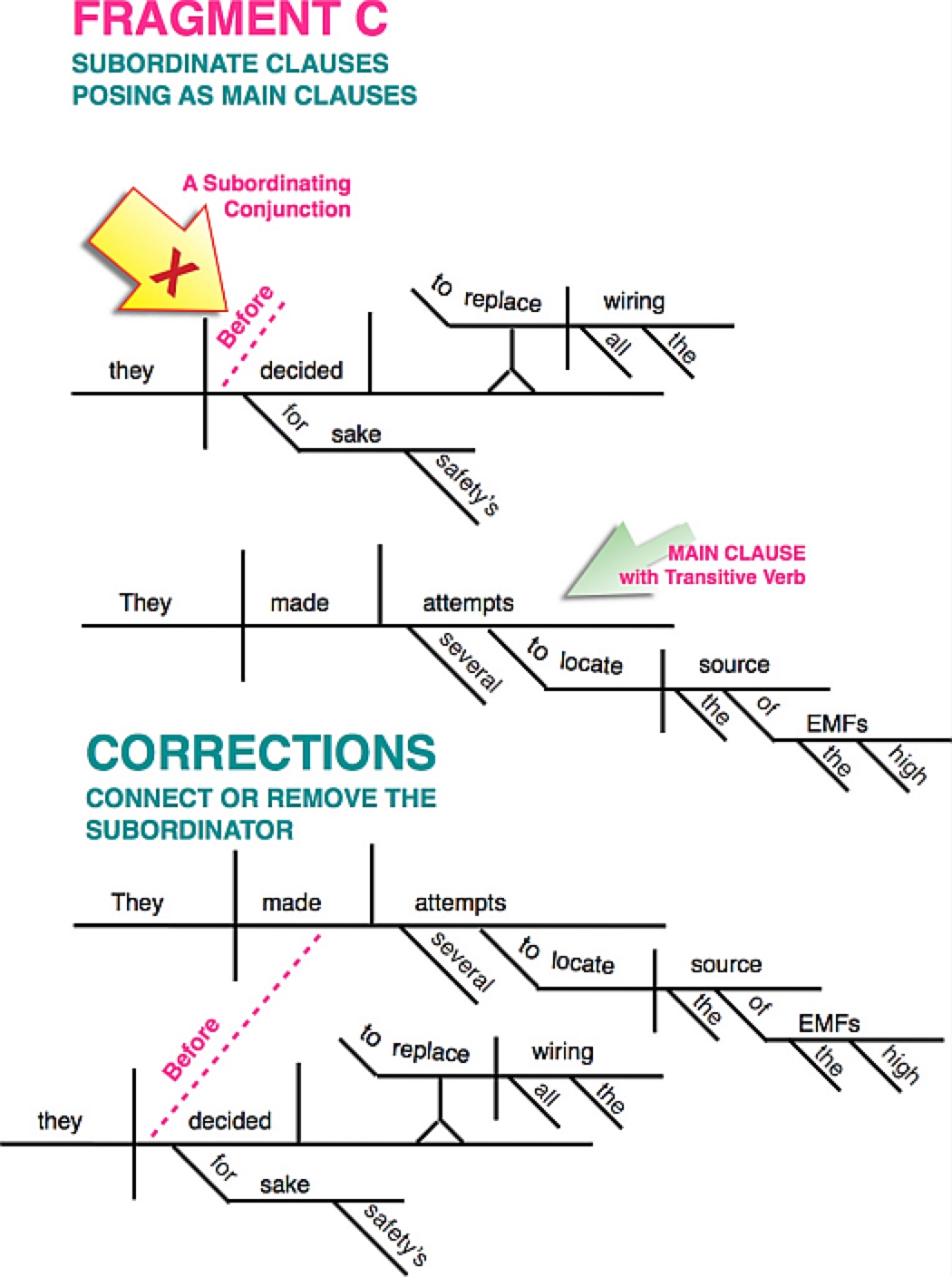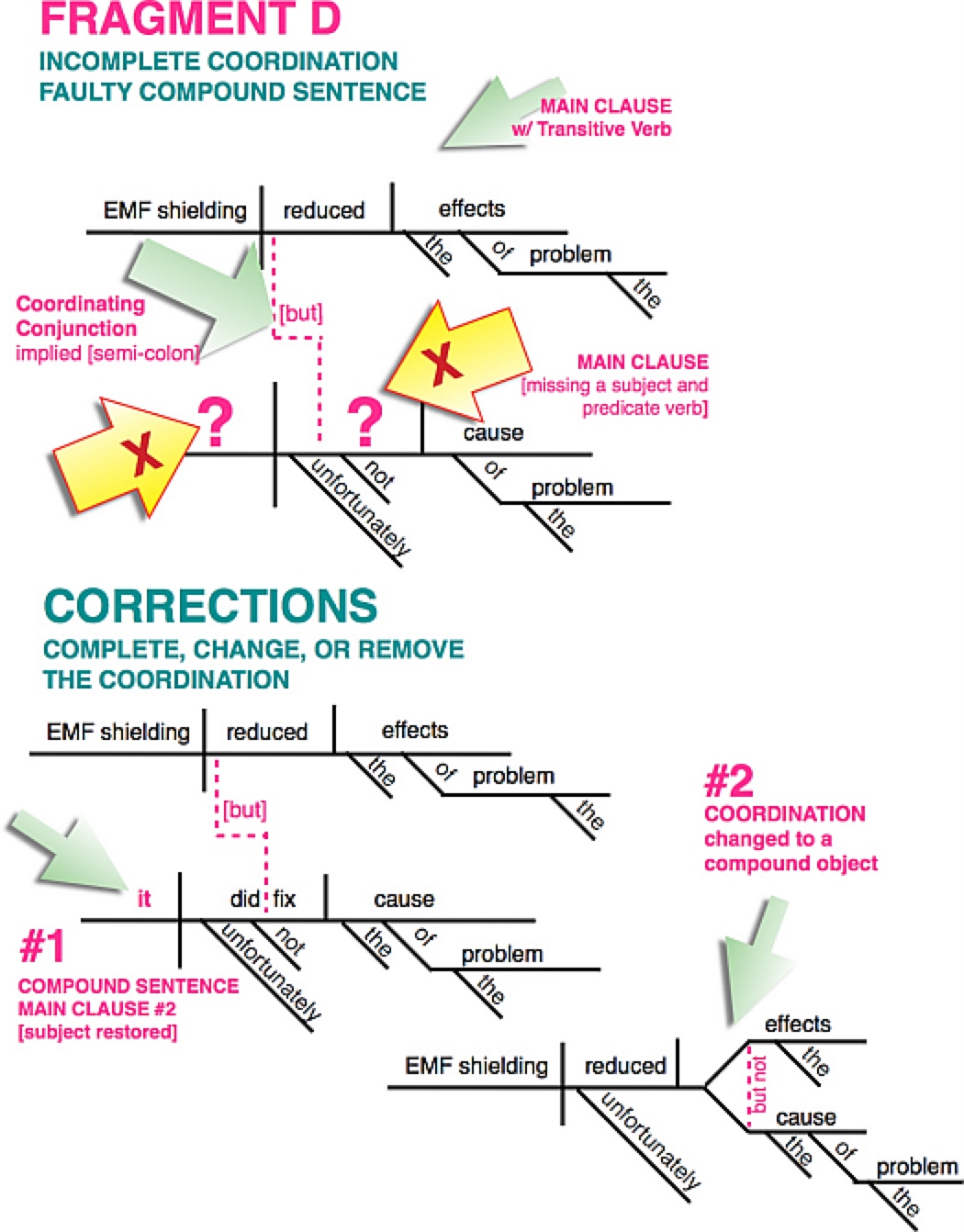
Karl J Sherlock
Associate Professor, English
Email: karl.sherlock@gcccd.edu
Phone: 619-644-7871
 TOPICS ON THIS PAGE
TOPICS ON THIS PAGESimply stated, fragments are incomplete sentences, either because they are not finished with proper predication, or because they lack the basic grammatical components that form independent clauses (SUBJECT + VERB). Why do fragments occur?
When you use one part of speech to serve the role of another in a sentence, it's like trying to hit the hammer with the nail. The function served by any part of speech has limitations and conditions, and when those are broken, the "bad" grammar damages the sentence structure by displacing good grammar. This type of error is also called a Mixed Construction.
Example

A clause must have a subject and a predicate. Without these, it is a phrase (excepting Noun Clauses). When a phrase acts like a clause, it causes a fragment:
Example

When you overlook subordinating words and relative pronouns, this could lead you to mistake a dependent clause as an independent one:
Example

There's an old expression: one bad apple spoils the bushel. So it is in compound sentences. When a phrase or a subordinate clauses poses as a main clauses in a compound sentence, the entire compound sentence is labeled as a fragment:
Example

Proofreading techniques are never fool-proof, and strategies for finding fragments are no exception. Sentence boundary errors (fragments, comma splices, fused and run-on sentences) are often a matter of not hearing properly where one sentence should end and another should begin. Therefore, proofreading for these errors is a matter of retraining one's ear to listen for problematic grammar and sentence construction.
There are six tried and true techniques for repairing a sentence fragment. Three of them involve moving and rearranging sentence elements, and three of them involve the more complex job of inventing and changing sentence elements. Some techniques are more appropriate than others for fixing certain types of fragments, but all six should be memorized and practiced. They are:
Some fragmented phrases and subordinate clauses can be joined to a sentence before or after them, whichever is more appropriate.
Fragmented version |
Fragment reattached (with comma) |
|
We packed everything we needed for a three-week vacation on the beaches of the Bahamas. Except for our swimsuits. |
We packed everything we needed for a three-week vacation on the beaches of the Bahamas, except for our swimsuits. |
Reattachment works only if the fragment follows from, or transitions into, one of the surrounding sentences, but in some instances you need to pick up the fragment and drop it inside one of these sentences. This means a process of reincorporating a lost phrase or subordinate clause.
Fragmented version |
Fragment incorporated into the sentence before it (two ways) |
|
We packed everything we needed for a three-week vacation on the beaches of the Bahamas. Except for our swimsuits. |
We packed everything we needed, except for our swimsuits, for a three-week vacation on the beaches of the Bahamas. Except for swimsuits, we packed everything we needed for a three-week vacation on the beaches of the Bahamas. |
The verb "parse" literally means to identify and name the parts of speech and syntactical relationship of each word used in a sentence. The word is also used figuratively to describe a process of "picking and choosing" according to what each thing contributes to the whole. Sometimes parsing a fragment's key words, and then incorporating those words into one of the surrounding sentences, is a better solution than merely re-incorporating a fragment as it's written.
Fragmented version |
Fragment parsed of its key words |
|
We packed everything we needed for a three-week vacation on the beaches of the Bahamas. Except for our swimsuits. |
We packed everything we needed but swimsuits, for a three-week vacation on the beaches of the Bahamas. |
Fragments sometimes are held back from being full sentences because, as clauses, they're missing one or more important parts of speech. To add what's missing takes a degree of creativity and invention, which then builds up the fragment so that it can stand on its own as an independent clause. This technique is different from "Changing."
Fragmented version |
Fragment built into a sentence |
|
We packed everything we needed for a three-week vacation on the beaches of the Bahamas. Except for our swimsuits. |
We packed everything we needed for a three-week vacation on the beaches of the Bahamas. Our swimsuits were the one exception, though. |
Some fragments are also mixed constructions: one part of speech inappropriately serving another, which hurts the grammar and, ultimately, the boundaries of a sentence. If you can correctly change the problem part of speech, you can convert the grammar so that it reflects a proper sentence.
Fragmented version |
Fragment changed into a subordinate clause, and attached/incorporated |
|
We packed everything we needed for a three-week vacation on the beaches of the Bahamas. Except for our swimsuits. |
We packed everything we needed for a three-week vacation on the beaches of the Bahamas, though we inconveniently forgot our swimsuits. |
The verb "cast" has many meanings, but most of them involve a process of scatter and collect: you can cast a fishing net; cast the dice; cast a mold. The cast of a play, for instance, is a collection of characters. When you "recast," then you "scatter and collect" again. In other words, you start over. If you can't make the grammar work for the collection of words you've cast into your sentence, then start over with a different collection of words and parts of speech. Recast.
Fragmented version |
Fragment recast |
|
We packed everything we needed for a three-week vacation on the beaches of the Bahamas. Except for our swimsuits. |
We packed everything for a three-week vacation on the beaches of the Bahamas, the one exception being the swimsuits we really needed. |
Karl J Sherlock
Associate Professor, English
Email: karl.sherlock@gcccd.edu
Phone: 619-644-7871